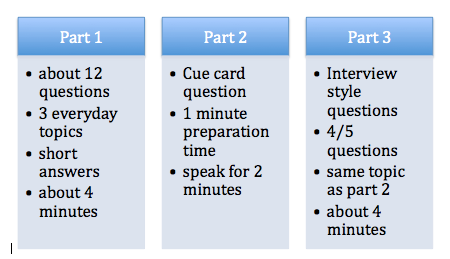本文是我昨天发表于微信「留学路上」的经验帖《备考口语:看这一篇文章就足够了》。现在稍加修改,希望能给大家一些备考的帮助。
首先先是一个视频。这个视频是Simon老师在2012年(如果没记错的话?)发布的一篇口语备考文章里面的视频。知乎不能发视频,大家戳这里就好:留学路上 - Speaking Part 2 Guide-高清观看。
视频可以说是简单粗暴地介绍了在家练习的方式,个人觉得特别实用——录音、誊写、修改的一整套的工作,虽然有点繁琐,但是对于一个人自己在家里练习,算是一个非常不错的方式。
对于修改自己的说话词汇的话,可以试着修改一些常用的词汇,例如and可以修改成为just as:- Just as individuals can learn from their mistakes, societies can (also)... - Just as we need to exercise the body, we also need to exercise the mind. 在举例的时候不用说for example、for instance,试试用- From what I've read in the newspapers,... - From what I've heard / seen / experienced,...。或者对于一些自己不是很确信的事情,不用一直说I guess或者I am not so sure,可以试试- If I had to guess what might happen in the future, I'd like to think that... - If I had to give my opinion, I'd say...等等。希望Simon老师的备考的这个视频可以给大家一些启发。
以下就从Part 1开始分部分讲解一下备考口语必须知道的事情,不止是怎么练习,还有怎么考试等等。

Part 1是用来给考官留一些好印象的时候,熟练回答考官的常见问题,尤其是「你是学生还是在工作」「你的专业是什么」「你的家乡是什么」之类的常见问题的回答要准备好。考官从房间里出来接你的时候,可能会说How are you,你也要准备好非常流利地回答「Good!How are you?」这个回答是我来美国之后发现的标准答案!千万不能说「I'm fine, thank you, and you?」虽然这可能是我们初学英语的头一两节课教的东西,但是这个说法大错特错!没有任何一个美国人会这样回答!记住!「Good!How are you?」!永远如此回答!!!
回答的内容的话不需要太多,2~4句话就好,偶尔可以多一些,偶尔可以稍微少一些,尽量不要只回答1句话,要不考官会追问的。调整心态,边回答边深呼吸(真的会特别的紧张的尤其是在国内考试的时候很多人都没有试过单独和一个外国人在一个小房间里呆着讲话的感觉)。
The first part of the IELTS Speaking Test lasts around 4 to 5 minutes. The examiner asks about 10 questions related to you, your daily life and your interests. Common topics are hobbies, family, friends, food, music etc. Part 1 questions are supposed to be easy, and the examiner must get through all of the questions in 5 minutes or less. That's only about 30 seconds per question. If you try to give long answers, the examiner will interrupt you. My advice is to keep Part 1 answers very simple:
这是Simon在2012年3月发表的文章里面说的,所以精简你的回答,不要太少不要太多、进入状态是正题。我第一次考的时候第一部分紧张得要死,每一句话说得清楚的,结果也可想而知了。
你的回答类似于:Do you prefer home-cooked food or food from restaurants? - I prefer home-cooked food because I think it's healthier and you know exactly what you're eating. I also enjoy cooking for family and friends. 这样的答案长度是比较差不多的,用词、句式也是第一部分比较正常规范的答案。
还有一个网站,IELTS speaking guide |这个口语专栏也是很不错,这个网站的写作部分也超级棒,外国的免费的雅思备考的资源库。
讲第二部分的话,就按第二部分的几个评判标准来说吧:
The fact that I told a story made my answer really coherent (clear and logically organised). In terms of fluency, my description was written rather than spoken, so of course there are no pauses or hesitations.
流畅性是雅思口语考试最重要的事情,你要尽可能地避免「呃呃呃呃呃呃呃呃呃」之类的停顿,遇到想不起来的词汇的时候,不要发出任何的声音!发出「呃呃呃呃呃呃呃呃呃」之类的停顿的毛病必须改掉!我之前在淘宝买外国人陪练的时候,第一节课的时候老外就告诉我需要改正这个毛病!我认识的法国人讲起英语的时候口音特别的重,用词很普通,interesting的发音永远是「in-特-ruei-死-请」,但是没有人会说她的英语口语很差,因为她讲的无敌流利,流利性跟美国人是没有差的,这会给跟你对话的人非常非常无敌好的印象。
对了,如果你想思考某个词的时候,说「you know」「well」之类的词,尝试说慢一点,让考官以为你是一个平常说话就很慢的人,这些都是比较有效的方法来避免你的停顿。
The description might seem simple, but it isn't. A wide resource of vocabulary is used naturally and accurately. There are definitely some 'less common' and idiomatic phrases (e.g. engrossed, the time passed, I suddenly realised, get going, my leg was dead, tipped over, to my surprise).
该部分可以参考之前说的,修改自己说过的话来实现,让自己的用词、句式可以更加丰富。
Unless you can find any mistakes, it would be difficult to give my description anything less than 9 for accuracy. The range of structures used is also easily good enough to impress the examiner.
这个部分同理,也是靠修改自己的说话的内容来实现,所以个人是强烈推荐按照上方的那个视频备考!绝对的是最基础口语备考的经验!
Hopefully this wouldn't be a problem as I'm a native speaker!
比重比较低,但是口音越标准越好,不是吗?我推荐大家下载英语流利说或者是有道口语大师之类的软件,之前的几门课都是最基础的nice to meet you之类的课程的,但是他们的矫正口音的机制特别棒,能够特别清楚地抓出你的某个词发音的问题。不信你们去练习看「to」这个词,看看你有没有可能一次过。我觉得你没有听他的解释的话,自己尝试5次都不一定会灭掉「to」这个词的红灯。口音问题Simon也解释过了:
People often ask whether their accent will affect their IELTS score. The simple answer is no. Your score for pronunciation depends on how clearly you speak and how intelligible (easy to understand) you are.
这个部分的价值最高了,我推荐的答题的结构是:Answer the question directly、Explain why、Give an example、Explain the alternative / opposite。为什么用这个结构?因为第三部分的话主要考察你自己的口语可以讲到多深入的问题,因此用这个结构可以非常有效的拓展你说话的思维,毕竟没有思考的时间给你,你要说足够多的东西真的很难,如果按照结构来的话,你填充这个结构就是了。
以一个小问题为例,题目是:Do you think that it's better to have clear aims for the future, or is it best to take each day as it comes?
如果按照上述的答题结构的话,答案可以组织为:(Answer) I think it's best to have a good idea of what you want to do with your life, especially in terms of studies and career. (Why) Having aims allows you to plan what you need to do today and tomorrow in order to achieve longer-term objectives. (Example) For example, if you want to become a doctor, you need to choose the right subjects at school, get the right exam results, and work hard at university. (Opposite) Without a clear aim, it would be impossible to take the necessary steps towards a career in medicine, or any other profession.
足足快100个单词,这样的回答在深度、长度上绝对OK了,你要做的更多的就是丰富自己的句式、词汇,而这些积累可以靠上述的视频的方法踏踏实实地完成。
以下是两个Simon的范例的答案,分别是按照上述的拓展的方式以及firstly, secondly, finally的分层结构来回答的,兴许可以给大家一些启发:
1) Do you think that it's important for people to go on holiday?
Yes, I think we all need to go on holiday at least once or twice a year. It isn’t healthy to work all year round without some time off to relax; we all need to take a break and recharge our batteries from time to time. Last summer, for example, I went on holiday to France for a couple of weeks, and it was great to leave all of my usual responsibilities behind me. I came home feeling really refreshed and reinvigorated.
2) Why do you think some people prefer not to go abroad on holiday?
I suppose there are different reasons why some people choose not to go abroad on holidays. Firstly, it’s usually more expensive to travel abroad than it is to stay at home. A second reason could be that some people find it stressful to spend time in a foreign country where they don’t speak the language, or where they feel that they can’t easily integrate with the locals. Finally, many people just love where they live, and don’t feel the need to travel abroad.
还有用雅思哥app备考啥的应该大家都知道了吧?不知道的同学找历史消息里面的9月21日的《(更新·实用)有哪些雅思托福备考 APP ?》文章即可!
好啦,截至目前,雅思专项的四个专项文章全部发布完毕了——